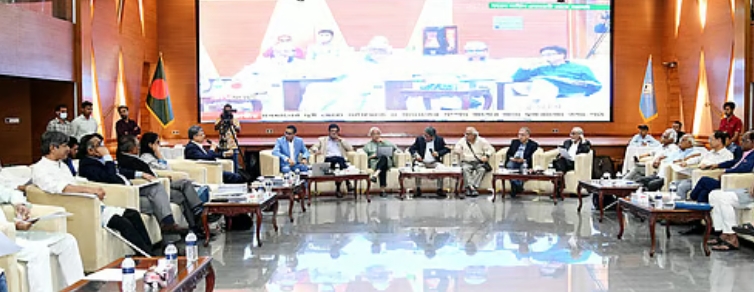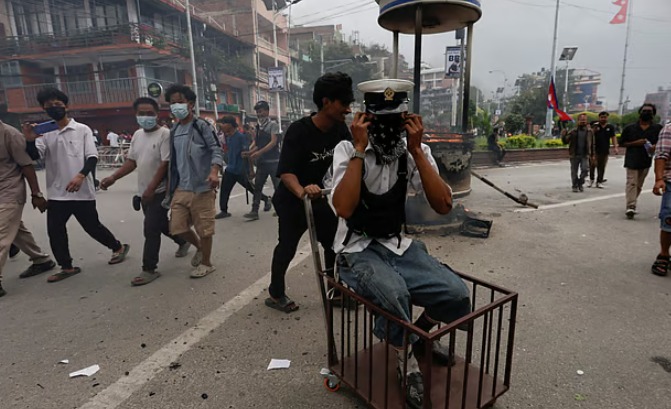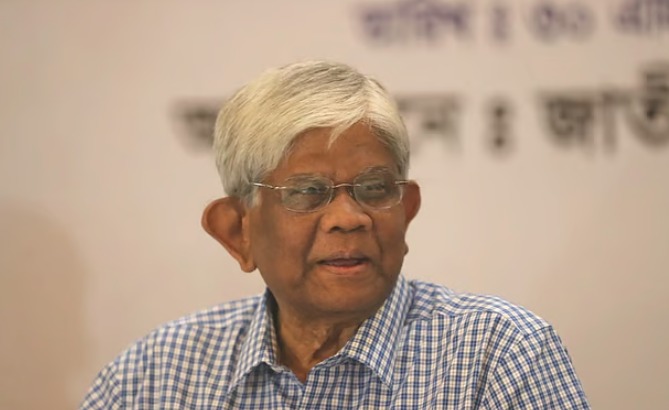Desk Report,
Independent MPs in Parliament without money bill and confidence vote
Leaders of various political parties in the second phase of the meeting with the National Consensus Commission on Article 70 of the Constitution, nomination of the chairperson of the standing committee, women’s representation, bicameral parliament and appointment of the Chief Justice. Yesterday at the Foreign Service Academy in the capital. Photo: PID
Independent MPs in Parliament without money bill and confidence vote
There has been a consensus among the political parties on changes to Article 70 of the Constitution, making the chairperson of some parliamentary committees from the opposition party and changing the existing method of appointing the Chief Justice.
On Tuesday, the National Consensus Commission reached a consensus on these issues in its discussions with the political parties. However, further discussions will be held on what will be the appointment process of the Chief Justice.
The decisions made based on the discussions with the parties on the basis of the commission’s discussions are that members of parliament (MPs) will have full power to vote against their own party in parliament on any issue other than money bills and confidence votes or will remain independent. The post of chairman of the parliamentary standing committee on matters of public importance, including government accounts, estimated accounts, government institutions and special rights, will be given to the opposition parties in proportion to the number of seats. That is, the opposition parties will get the post of chairman of the parliamentary committee in proportion to the number of seats they get in parliament. Follow

Leaders of various political parties in the second phase of the meeting with the National Consensus Commission on Article 70 of the Constitution, nomination of the chairman of the standing committee, women’s representation, bicameral parliament and appointment of the Chief Justice. Yesterday at the Foreign Service Academy in the capital. Photo: PID
There has been a consensus among the political parties on changes to Article 70 of the Constitution, making the chairman of some parliamentary committees from the opposition party and changing the existing method of appointing the Chief Justice.
Yesterday, the National Consensus Commission reached a consensus on these issues in its discussions with the political parties on Tuesday. However, there will be further discussions on what the appointment process of the Chief Justice will be.
The decisions made based on the commission’s discussions with the parties are that members of parliament (MPs) will have full power or will be independent in voting against their own party in parliament on any issue other than money bills and confidence votes. The post of chairman of the parliamentary standing committee on matters of public importance, including government accounts, estimated accounts, government institutions and special rights, will be given to the opposition parties in proportion to the number of seats they win in parliament. That is, the opposition parties will get the post of chairman of the parliamentary committee in proportion to the number of seats they win in parliament.
The second phase of the adjourned discussion has begun on the proposals that were not agreed upon in the first phase. 29 parties participated yesterday, but Jamaat did not.
The discussion began at around 12:45 pm yesterday at the Doel Hall of the Foreign Service Academy in the capital. The discussion continued until around 5:30 pm with an hour-long lunch break. After the discussion, the day’s decisions were presented to journalists by Professor Ali Riaz, vice-chairman of the National Consensus Commission. Discussions with the parties will be held again on Wednesday.
Representatives of 29 parties and alliances including BNP, Jatiya Nagorik Party, Islami Andolan, Nagorik Oikya, Gana Odhikar Parishad, Gana Sanghati Andolan participated in yesterday’s discussion. However, Jamaat-e-Islami did not participate in yesterday’s discussion.
On the other hand, the Jatiya Nagorik Party (NCP) questioned the process by which an attempt is being made to create a national consensus by participating in the discussion. NCP’s senior joint convener Ariful Islam Adeeb also alleged that the discussion is being centered around one person from a party. He also questioned the method by which political parties were called to the commission’s discussion. This question was also raised by Gana Odhikar Parishad President Nurul Haque. The discussion was broadcast live on BTV News.
Chief Advisor Professor Muhammad Yunus inaugurated the second phase of the discussion on June 2 to reach a consensus on the proposals for fundamental reforms that were not agreed upon in the first phase of the discussion. The second phase of the discussion began on June 3 with thematic discussions. Three issues (Article 70 of the Constitution, nomination of the chairman of the Standing Committee, and reserved seats for women in Parliament) were discussed that day, but no decision was made. The adjourned discussion began yesterday. The agenda for discussion included the three issues of June 3 and the appointment process of a bicameral Parliament and the Chief Justice.



